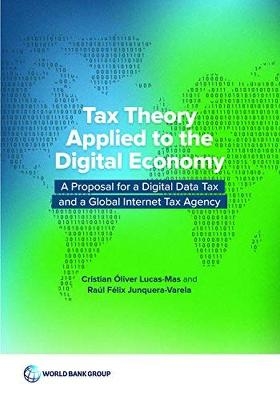
Tax theory applied to the digital economy
a proposal for a digital data tax and a global internet tax agency
Seiten
2021
World Bank Publications (Verlag)
978-1-4648-1654-3 (ISBN)
World Bank Publications (Verlag)
978-1-4648-1654-3 (ISBN)
- Titel z.Zt. nicht lieferbar
- Versandkostenfrei innerhalb Deutschlands
- Auch auf Rechnung
- Verfügbarkeit in der Filiale vor Ort prüfen
- Artikel merken
Analyses the tax disruptive aspects of new digital business models to determine the need for new tax measures to address the tax challenges of the digitalization of the economy, and presents a proposal for the adoption of a Digital Data Tax and a Global Internet Tax Agency.
Digital technology allows businesses to operate in a country without a physical presence, which poses challenges for traditional taxation. The digital debate focuses on direct taxation and the creation of new taxing rights arising from the tax claims of market jurisdictions on income obtained by foreign digital suppliers conducting business therein without any physical presence. Tax Theory Applied to the Digital Economy analyzes the tax-disruptive aspects of digital business models and reviews current tax initiatives in light of traditional tax theory principles. The analysis concludes that market countries' tax claims are unsubstantiated and contravene the most basic foundations of tax theory, giving rise to a series of legal, economic, tax policy, and tax administration issues that policy makers cannot overlook. The authors propose establishing a digital data tax (DDT) that is a license-type consumption tax, rather than an income tax, on the international supply of Internet bandwidth to access digital markets. The DDT can be applied either globally or unilaterally, and could become a significant source of tax revenues for market jurisdictions. It is aligned with tax principles and it does not conflict with other tax initiatives: the DDT taxes foreign digital companies as consumers, while income tax proposals tax them as suppliers. The authors also propose creating a new global Internet tax agency (GITA) under the auspices of the United Nations that would provide a neutral forum for political discussion and technical assistance in the area of digital taxation. The digital economy is a global phenomenon that requires a global solution: the creation of global taxing mechanisms and global institutions that provide technical assistance and support for successful global implementation. The book explains difficult technical concepts in plain language and contributes to the digital tax debate in a way that can be understood by anyone. Such understanding is essential to obtaining global support, achieving tax compliance, and fostering multilateral tax cooperation
Digital technology allows businesses to operate in a country without a physical presence, which poses challenges for traditional taxation. The digital debate focuses on direct taxation and the creation of new taxing rights arising from the tax claims of market jurisdictions on income obtained by foreign digital suppliers conducting business therein without any physical presence. Tax Theory Applied to the Digital Economy analyzes the tax-disruptive aspects of digital business models and reviews current tax initiatives in light of traditional tax theory principles. The analysis concludes that market countries' tax claims are unsubstantiated and contravene the most basic foundations of tax theory, giving rise to a series of legal, economic, tax policy, and tax administration issues that policy makers cannot overlook. The authors propose establishing a digital data tax (DDT) that is a license-type consumption tax, rather than an income tax, on the international supply of Internet bandwidth to access digital markets. The DDT can be applied either globally or unilaterally, and could become a significant source of tax revenues for market jurisdictions. It is aligned with tax principles and it does not conflict with other tax initiatives: the DDT taxes foreign digital companies as consumers, while income tax proposals tax them as suppliers. The authors also propose creating a new global Internet tax agency (GITA) under the auspices of the United Nations that would provide a neutral forum for political discussion and technical assistance in the area of digital taxation. The digital economy is a global phenomenon that requires a global solution: the creation of global taxing mechanisms and global institutions that provide technical assistance and support for successful global implementation. The book explains difficult technical concepts in plain language and contributes to the digital tax debate in a way that can be understood by anyone. Such understanding is essential to obtaining global support, achieving tax compliance, and fostering multilateral tax cooperation
| Erscheinungsdatum | 12.04.2021 |
|---|---|
| Zusatzinfo | figs, tables |
| Verlagsort | Washington |
| Sprache | englisch |
| Themenwelt | Recht / Steuern ► Steuern / Steuerrecht |
| Wirtschaft ► Allgemeines / Lexika | |
| Wirtschaft ► Betriebswirtschaft / Management ► Finanzierung | |
| Wirtschaft ► Volkswirtschaftslehre ► Wirtschaftspolitik | |
| ISBN-10 | 1-4648-1654-9 / 1464816549 |
| ISBN-13 | 978-1-4648-1654-3 / 9781464816543 |
| Zustand | Neuware |
| Informationen gemäß Produktsicherheitsverordnung (GPSR) | |
| Haben Sie eine Frage zum Produkt? |
Mehr entdecken
aus dem Bereich
aus dem Bereich
Allgemeines Steuerrecht, Abgabenordnung, Umsatzsteuer
Buch | Softcover (2024)
Springer Gabler (Verlag)
28,00 €
Band 1: Grundlagen der Besteuerung, Ertragsteuern
Buch | Softcover (2024)
Vahlen (Verlag)
29,80 €
Investition, Finanzierung, Finanzmärkte und Steuerung
Buch | Softcover (2022)
Vahlen (Verlag)
39,80 €


